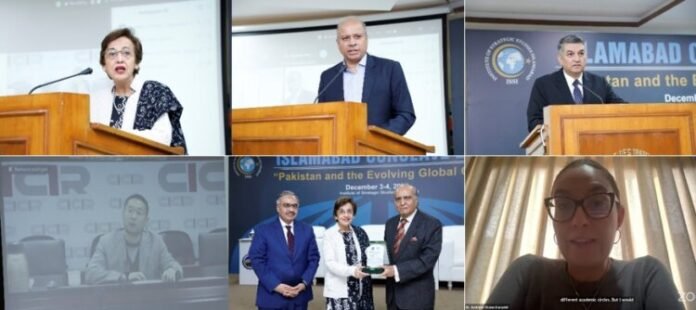ISLAMABAD: The China-Pakistan Study Centre (CPSC) at the Institute of Strategic Studies Islamabad (ISSI) inaugurated the Islamabad Conclave 2024 with its first working session, “Major Power Competition: Emerging Realities.” The session, a key highlight of the event, brought together prominent experts to explore the dynamics of global power struggles and their implications.
The panel featured notable speakers, including Ambassador Tehmina Janjua, former Foreign Secretary of Pakistan; Prof. Dr. Hu Shisheng, Director of the China Institute of Contemporary International Relations (CICIR); Dr. Farhan Hanif Siddiqui, Professor at Quaid-i-Azam University; and Dr. Andreea Stoin-Karadeli, Assistant Professor at the University of Texas Rio Grande Valley. The discussion was moderated by Dr. Talat Shabbir, Director of CPSC, and attended by diplomats, academics, students, and members of civil society.
Key Takeaways from the Session
Ambassador Tehmina Janjua:
In her keynote address, Ambassador Janjua underlined the increasing dominance of major powers in shaping global narratives. She argued that smaller states are often pressured to align with external powers in a world shaped by intense competition. However, she proposed that neutral alliances among small and medium-sized states could counter this trend, avoiding bloc politics. Focusing on Pakistan’s priorities, she emphasized the need for pragmatic engagement with India under respectful conditions and highlighted the significance of South and West Asia for Pakistan’s foreign policy. She also warned of potential pressures on Pakistan for a regional settlement akin to the Abraham Accords after the Gaza conflict.
Dr. Hu Shisheng:
Dr. Hu presented the Belt and Road Initiative (BRI) as a cornerstone of global connectivity and economic collaboration. Highlighting its success over the past decade, he pointed to significant contributions like job creation in Laos and enhanced regional trade in Africa. The BRI, he noted, has deepened China’s economic integration with 267 European cities, underscoring its role in global trade, which has grown by 20% since the initiative’s inception.
Dr. Farhan Hanif Siddiqui:
Dr. Siddiqui shed light on the multifaceted nature of contemporary power rivalries, contrasting today’s interconnected “multiplex” world with the bipolar era of the Cold War. He highlighted China’s inclusive approach to international relations, exemplified by its role in normalizing ties between Iran and Saudi Arabia. According to Dr. Siddiqui, today’s global order is shaped by a blend of states, societies, and cultures, moving beyond the traditional state-centric framework and military power.
Dr. Andreea Stoin-Karadeli:
Dr. Karadeli discussed the broadening scope of US-China competition, encompassing technology, military influence, and geopolitical dominance. She raised concerns about the resurgence of nuclear uncertainties but emphasized areas like cybersecurity, global health, and pandemic management as potential grounds for collaboration. Despite intensifying rivalries, she argued, cooperative efforts in such domains could reduce global risks.
Dr. Talat Shabbir:
In his opening remarks, Dr. Shabbir highlighted Pakistan’s pivotal role in the evolving global order due to its geostrategic position and ties with both China and the United States. He underscored Pakistan’s potential to act as a bridge for peace, economic growth, and connectivity in an era shaped by competition and collaboration among major powers.
The session provided a nuanced exploration of emerging global realities, focusing on Pakistan’s strategic position and the evolving dynamics of major power rivalries. The Islamabad Conclave 2024 continues to serve as a platform for fostering informed discourse on issues shaping the global and regional landscape.




